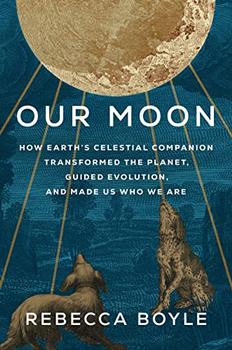Summary | Excerpt | Reviews | Beyond the Book | Readalikes | Genres & Themes | Author Bio

How Earth's Celestial Companion Transformed the Planet, Guided Evolution, and Made Us Who We Are
by Rebecca Boyle
Humans are sensory beings, and the Moon is a place devoid of any familiar sensory experience. If you were to visit, you might experience conflicting feelings of deprivation and overwhelm. Every time you went outside—in a spacesuit, of course—and every time you went back indoors and took off your gear, the Moon would bowl you over. You would feel lonely, hot, freezing, terrified, ecstatic, superhuman, and tiny, in a matter of moments or maybe all at once. Its topography, its innards, its atmosphere—everything about the Moon is different.
Apollo 11 moonwalkers Neil Armstrong and Buzz Aldrin were the first human beings to experience selenic discomfort. Moon dust covered their spacesuits and boots, and it soon covered much of the inside of their Eagle lander, too. The pair were so annoyed by it that they slept in their helmets to avoid breathing in Moon all night. On later missions, astronauts noticed the dust scratched their sun visors and damaged the seals on the rock boxes they toted home. Moon dust caused a form of hay fever, making astronauts' eyes watery and itchy and their throats scratchy and sore. Unlike Earth dust, which is mostly made of organic material, Moon dust is all pulverized rock—and no water or wind exists to soften the dust grains' edges. It was like breathing in sandpaper.
But the astronauts were lucky that this was nothing more than a nuisance. NASA scientists had warned the astronauts that Moon dust might be reactive in oxygen. Aldrin and Armstrong were told to be cautious about their contingency sample, a small scoop of Moon that Armstrong tucked into his pocket moments after stepping out of the Eagle. After coming back inside, Aldrin and Armstrong watched the dust carefully as the Eagle cabin pressurized. If anything started to smolder, they were supposed to open the hatch and throw it out. But both men were completely coated in it.
"The stuff seemed to stick to things and stay there," Aldrin said. "There was no hope of getting that off." If anything was going to ignite, it would be their suits.
The dust turned out not to be reactive in oxygen, but it did smell that way. The Moon has an acrid aroma, like fireworks that have just gone off. That is how Aldrin described the scent in the capsule after he and Armstrong came back inside from their brief sojourn and took off their helmets. Armstrong described it as "the smell of wet ashes," like a campsite at bedtime after you've doused the fire. Apollo 17 astronaut Harrison "Jack" Schmitt has called it the smell of gunpowder.
The Moon is constantly bombarded by sunlight and radiation from other stars and cosmic sources, and it's pummeled by asteroids in a process called "gardening." All this action tears apart atoms in the "regolith," the technical term for Moon dust. Lunar regolith is about 43 percent oxygen, so most of the atoms being shattered are oxygen atoms. The same is true of gunpowder. When it ignites, chemicals in the gunpowder release copious oxygen, further fueling the blast. What the astronauts smelled was the lingering aftermath of atoms being torn apart by tiny invisible bullets of radiation.
This is still a matter of scientific debate in part because the Moon rocks don't have a smell anymore. When a scientist opens a bag with a Moon rock today, no matter how carefully it was chipped and packed up for distribution by NASA's Lunar Sample Laboratory, there is no scent of the unknown. No one can say for sure why the smell fades once the rocks are exposed to humans, and to Earth.
On the Moon, after you got used to the smell of constant fireworks, you would notice the unceasing dryness. The Moon is a parched place, and you would dearly miss the omnipresence of water to which you have been accustomed your entire waking life. It would tease you every time you saw Earth. However familiar and beloved our continents and their mountains, Earth's land does not dominate the planet's features; from a distance, the water is what stands out, a blue beacon of serenity and warmth.
Excerpted from Our Moon by Rebecca Boyle. Copyright © 2024 by Rebecca Boyle. Excerpted by permission of Random House. All rights reserved. No part of this excerpt may be reproduced or reprinted without permission in writing from the publisher.
Your guide toexceptional books
BookBrowse seeks out and recommends the best in contemporary fiction and nonfiction—books that not only engage and entertain but also deepen our understanding of ourselves and the world around us.